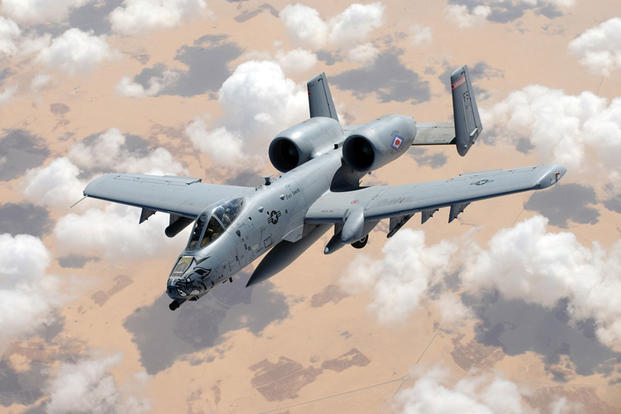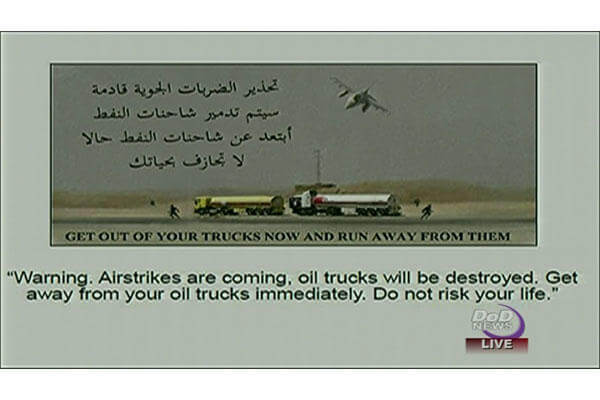The leaflets telling Syrian truck drivers to run for their lives were emblematic of the stark differences between the U.S. and Russian air campaigns that will make greater cooperation pushed by the White House again Thursday difficult to achieve.
About 45 minutes before A-10 Thunderbolt II and AC-130 Spectre gunships attacked, fighters made low passes over 116 oil truck tankers in eastern Syria last Sunday to drop leaflets.
"Get out of your trucks now and run away from them," the leaflets told the drivers. "Warning. Airstrikes are coming, oil trucks will be destroyed. Get away from your oil trucks immediately. Do not risk your life."
"We combine these leaflet drops with very low altitude passes of some of our attack aviation, which sends a very powerful message," Army Col. Steve Warren, a spokesman for Combined Joint Task Force-Operation Inherent Resolve, said in Wednesday from Baghdad during a teleconference at the Pentagon.
The leaflet drop was more evidence of the pains taken by the U.S. in air tasking orders to avoid civilian casualties through precision weaponry and the use of intelligence assets in contrast to indiscriminate Russian airstrikes with "dumb bombs," Warren said.
President Barack Obama and Secretary of State John Kerry have talked up the possibility of more coordination with Russia against the Islamic State of Iraq and Syria, or ISIS, since the Paris attacks and Russian President Vladimir Putin’s vow of "vengeance" earlier this week for the apparent bombing of a Russian airliner claimed by an ISIS affiliate that killed all 224 aboard.
France has also stepped up airstrikes in Syria and French President Francois Hollande was to visit Washington next week and later Moscow in what has been billed as an attempt to forge a consensus among the three nations on attacking ISIS, also known as ISIL (Islamic State of Iraq and the Levant, and Daesh, an Arabic acronym).
In Manila, where Obama was meeting with Asian allies on the proposed Trans Pacific Partnership, Deputy National Security Adviser Ben Rhodes on Thursday took note of the intense Russian airstrikes Tuesday on the ISIS stronghold of Raqqa in eastern Syria.
"If that becomes a trend and that continues, again, we think that would be the most constructive role for Russia to play so that they are a part of what we are doing as a coalition to go after ISIL safe havens," Rhodes said.
"If Russia wants to shift its focus to ISIL, that would be to the world’s benefit," Rhodes said.
The Russian Ministry of Defense said that airstrikes Tuesday were carried out by 25 long-range Tupolev bombers – including five Tu-160 Blackjack bombers, six Tu-95M Bears and 14 Tu-22M3 Backfires -- which fired a total of 34 cruise missiles and dropped munitions. Additional strikes were carried Wednesday in what was believed to be the biggest Russian air campaign since the Soviet occupation of Afghanistan.
The Ministry of Defense said that the U.S.-led coalition was given advance warning of the airstrikes. "In order to ensure safety, the representatives of the international coalition are notified about the time of the airstrikes and the routes of the aircraft in advance," the ministry said in its statement Wednesday.
Earlier this week, Obama said that he welcomed the intensified air campaign by the Russians and added, "We are actually helping facilitate them doing so."
However, Col. Warren said at the Pentagon briefing that communications between the U.S. military and Russia were minimal and he scoffed at the Russians’ "antiquated tactics" that he said took no regard for civilian casualties.
"As far as what the president said, you know, certainly I'm aware of what the president said," Warren said. "We right now here on the ground are not in any type of communications or coordination with the Russians" and have no plans to do so, he said. "So that's something that's being worked at a higher level," he said.
"We don't have a great read on the civilian casualty piece" from the Russian airstrikes, Warren said, but "the Russians are using dumb bombs. Their history has been both reckless and irresponsible," he said.
"I know there was some discussion that the Russians had a large air armada flying into Raqqa to conduct these operations," he said. "And it was notable to us that, you know, those are antiquated tactics. We don't even use those types of tactics anymore.
"The idea of putting, you know, ten ships in the air at one time, or 12 or even more, are very old fashioned," Warren said. "And those are the type of tactics needed only if you don't possess the technology, the skills and the capabilities to conduct the type of precision strikes that our coalition conducts."
--Richard Sisk can be reached at Richard.Sisk@military.com.






























